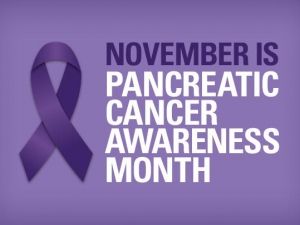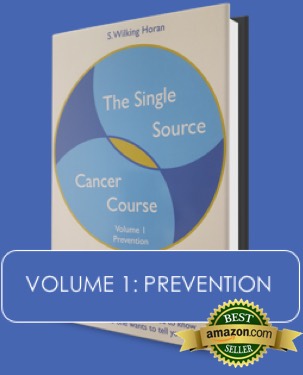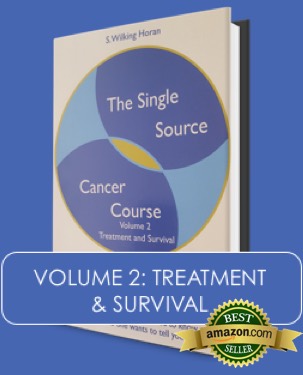 PURPLE WITH A PURPOSE – WHAT’S NEW IN THE FIGHT?
PURPLE WITH A PURPOSE – WHAT’S NEW IN THE FIGHT?
Welcome everyone to another FACTUAL FRIDAY. It’s November – the beginning of the Holiday Season — and it’s also PANCREATIC CANCER AWARENESS MONTH.
Now, pancreatic cancer is what I call a “silent cancer.” This means that it often remains asymptomatic and undiagnosed until it is more advanced. And, when a cancer is diagnosed later in its development, our chances of treating it successfully are smaller.
Accordingly, medical research is constantly trying to find ways to detect this cancer earlier, to understand its causes better AND to treat it more effectively.
So, let’s begin with a few facts. Pancreatic cancer is the tenth most common cancer in the world. It affects both sexes, but is more often found in men than women. And, in this country alone, this means that over 60,000 people every year are diagnosed with this cancer.
Although it’s difficult to say with certainty what actually causes pancreatic cancer, there are a few factors that are linked to its development. These include tobacco use, obesity, certain occupations and one’s medical family history.
Specifically, if Lynch, von Hippel-Lindau or Peutz-Jeghers syndrome, cirrhosis of the liver, diabetes mellitus or hereditary breast and ovarian cancer syndrome run in your family, you have a greater risk for developing pancreatic cancer.
This information will help give us a heads-up for this cancer and in assessing our personal risk. But, should we ever be diagnosed, what is science doing to help treat this cancer?
Fortunately, there are several new treatments that are proving effective even when the disease is discovered late in its development.
- IMMUNOTHERAPY. A number of clinical trials that use vaccines to treat different cancers now include pancreatic cancer. The vaccine itself is often made from pancreatic cancer cells, bacteria or a patient’s specific tumor cells. Such vaccines can be administered after, during or even instead of chemotherapy.
- TARGETED THERAPY. This approach involves the use of drugs designed to attack cancer tumors directly. With pancreatic cancer, the drug erlotinib may be combined with gemcitabine to fight the cancer cells. Researchers also are working with drugs that target a gene called Ras. This gene is often mutated in pancreatic cancer and if we can treat this mutation, we can more effectively treat the cancer itself.
- GENE THERAPY. This therapy delivers specific genes to cancer cells, which are often carried by specially designed viruses. Now, the genes that are delivered to the cancer cells are normal genes, without mutations. Once these normal genes are inside a cancer cell, they replace the abnormal genes that contribute to cancer growth.
 GENETIC AND MOLECULAR RESEARCH related to gene therapy is based on identifying damaged genes and proteins. Once pancreatic tumor samples are identified through DNA sequencing and mutational analysis, they can be repaired. This analysis can even be performed on blood samples. Once the information is gathered, new drugs can be developed that target pancreatic cancer cells and reduce their growth.
GENETIC AND MOLECULAR RESEARCH related to gene therapy is based on identifying damaged genes and proteins. Once pancreatic tumor samples are identified through DNA sequencing and mutational analysis, they can be repaired. This analysis can even be performed on blood samples. Once the information is gathered, new drugs can be developed that target pancreatic cancer cells and reduce their growth.
- CHEMOTHERAPY. Here again, with all the new information research is uncovering, more effective chemotherapy drugs are being developed. For instance, the new drug nanoliposomal irinotecan has now been approved for the treatment of advanced pancreatic cancer.
- CBD. This is a naturally occurring, non-psychoactive element of cannabis. Its use in conjunction with traditional chemotherapy has been found to reduce inflammation and combat tumor and cancer cells. Even though CBD improves the effectiveness of chemotherapy and possesses anti-cancer properties, it’s still a schedule-1 substance under federal government guidelines which makes research difficult. The hope is that CBD will help prolong the lives of pancreatic cancer human patients as it has with animal models.
- STEM CELLS. Stem cells found in pancreatic cancer tumors are particularly resistant to traditional therapies. New research is focused on treatments that directly target those cancer stem cells to fight pancreatic cancer and inhibit its growth.
Moreover, researchers are finding ways to detect cancer of the pancreas earlier when it can be more effectively treated. Special blood tests and new diagnostic imaging tools can help us find mutated tissue at its “precancerous” stage, known as pancreatic intraepithelial neoplasia or PanIN lesions. These screening procedures are proving quite effective for individuals with a strong family history of the genetic conditions linked to pancreatic cancer.
mutated tissue at its “precancerous” stage, known as pancreatic intraepithelial neoplasia or PanIN lesions. These screening procedures are proving quite effective for individuals with a strong family history of the genetic conditions linked to pancreatic cancer.
Unfortunately, we can’t prevent any cancer completely. But, with pancreatic cancer, we are making progress. We are increasing the chances of survival for every individual affected by the disease. These new tools and this important information can help us TAKE CHARGE of our personal healthcare – even when we’re discussing a “silent” cancer like that of the pancreas.
There is always hope. And, medical science and research continues to move forward in our common goal and fight to overcome all cancers.
This month PURPLE HAS A PURPOSE. It’s PANCREATIC CANCER AWARENESS MONTH. Let’s learn all we can so we can BE PREPARED and PROACTIVE. And, let’s be thankful for all the Healthy and Loving people in our lives! 😊
Until next time everyone, stay in GOOD HEALTH and . . .
TAKE THE COURSE AND TAKE CHARGE!



Leave a Comment